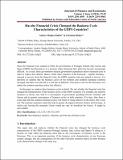Files in this item
Has the financial crisis changed the business cycle characteristics of the GIIPS countries?
Item metadata
| dc.contributor.author | Hughes Hallett, Andrew | |
| dc.contributor.author | Richter, Christian | |
| dc.date.accessioned | 2016-05-26T11:30:04Z | |
| dc.date.available | 2016-05-26T11:30:04Z | |
| dc.date.issued | 2014 | |
| dc.identifier.citation | Hughes Hallett , A & Richter , C 2014 , ' Has the financial crisis changed the business cycle characteristics of the GIIPS countries? ' , Journal of Finance and Economics , vol. 2 , no. 4 , pp. 25-49 . https://doi.org/10.12735/jfe.v2i4p25 | en |
| dc.identifier.issn | 2291-4951 | |
| dc.identifier.other | PURE: 242995690 | |
| dc.identifier.other | PURE UUID: 9e3e9b5d-6f8a-4aa2-b6a7-70eb0f9f2d40 | |
| dc.identifier.uri | https://hdl.handle.net/10023/8878 | |
| dc.description.abstract | Since the financial crisis erupted in 2008, the governments of Portugal, Ireland, Italy Greece and Spain (GIIPS) find themselves in a position where financing their debts has become increasingly difficult. As a result, these governments reduced government expenditure and/or increased taxes in order to reduce their deficits. Hence, whilst other countries in the Eurozone – notably Germany - enjoyed a recovery from the financial crisis, the GIIPS countries only just started to recover. It is therefore no surprise that the business cycles of the northern and southern European countries diverged, and there was and still is a real fear of deflation. This poses a risk for the Eurozone, as it makes the common monetary policy less effective. In this paper we analyse these business cycles in detail. We ask whether the financial crisis has changed the characteristics of the business cycles of the GIIPS countries. For example, the austerity measures in Greece may lead to a convergence of government spending between Germany and Greece and to greater convergence of business cycles in both countries. If it does, then there is some hope that the common monetary policy will return to being effective in the future. But it may not. The austerity measures could also lead to greater divergence between Greece and Germany, in which case leaving the monetary Union would not only be beneficial for Greece. It might be unavoidable. | |
| dc.format.extent | 25 | |
| dc.language.iso | eng | |
| dc.relation.ispartof | Journal of Finance and Economics | en |
| dc.rights | Copyright © Andrew Hughes Hallett & Christian Richter. This article is published under license to Science and Education Centre of North America. This is an Open Access article distributed under the terms of the Creative Commons Attribution 4.0 International License. | en |
| dc.subject | Time-frequency analysis | en |
| dc.subject | Coherence | en |
| dc.subject | Growth rates | en |
| dc.subject | Business cycle | en |
| dc.subject | HB Economic Theory | en |
| dc.subject | HG Finance | en |
| dc.subject.lcc | HB | en |
| dc.subject.lcc | HG | en |
| dc.title | Has the financial crisis changed the business cycle characteristics of the GIIPS countries? | en |
| dc.type | Journal article | en |
| dc.description.version | Publisher PDF | en |
| dc.contributor.institution | University of St Andrews. School of Economics and Finance | en |
| dc.identifier.doi | https://doi.org/10.12735/jfe.v2i4p25 | |
| dc.description.status | Peer reviewed | en |
This item appears in the following Collection(s)
Items in the St Andrews Research Repository are protected by copyright, with all rights reserved, unless otherwise indicated.

